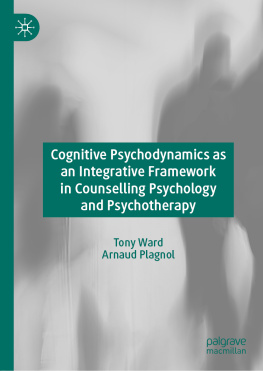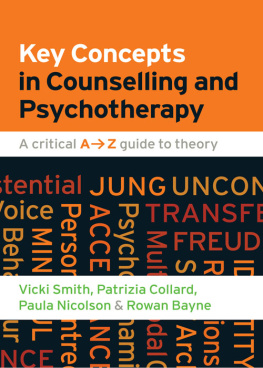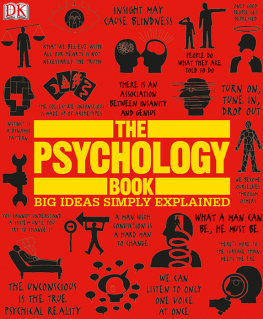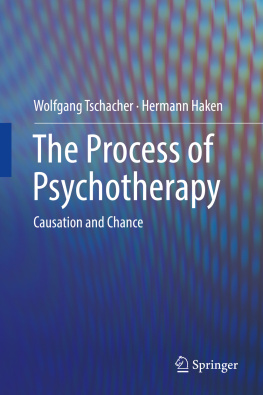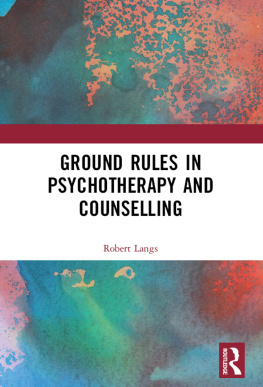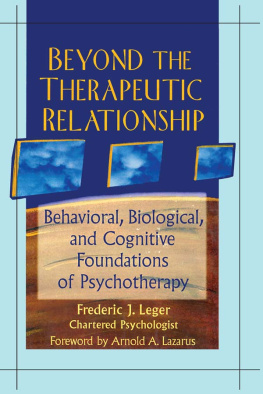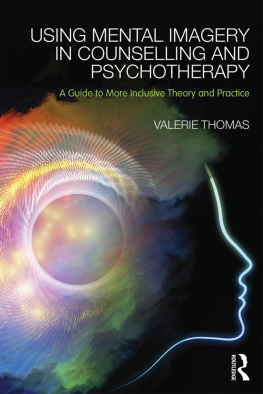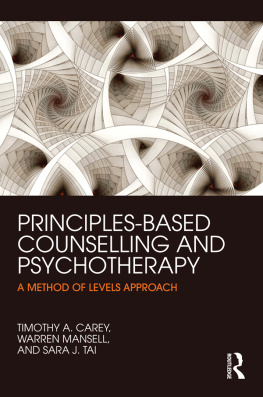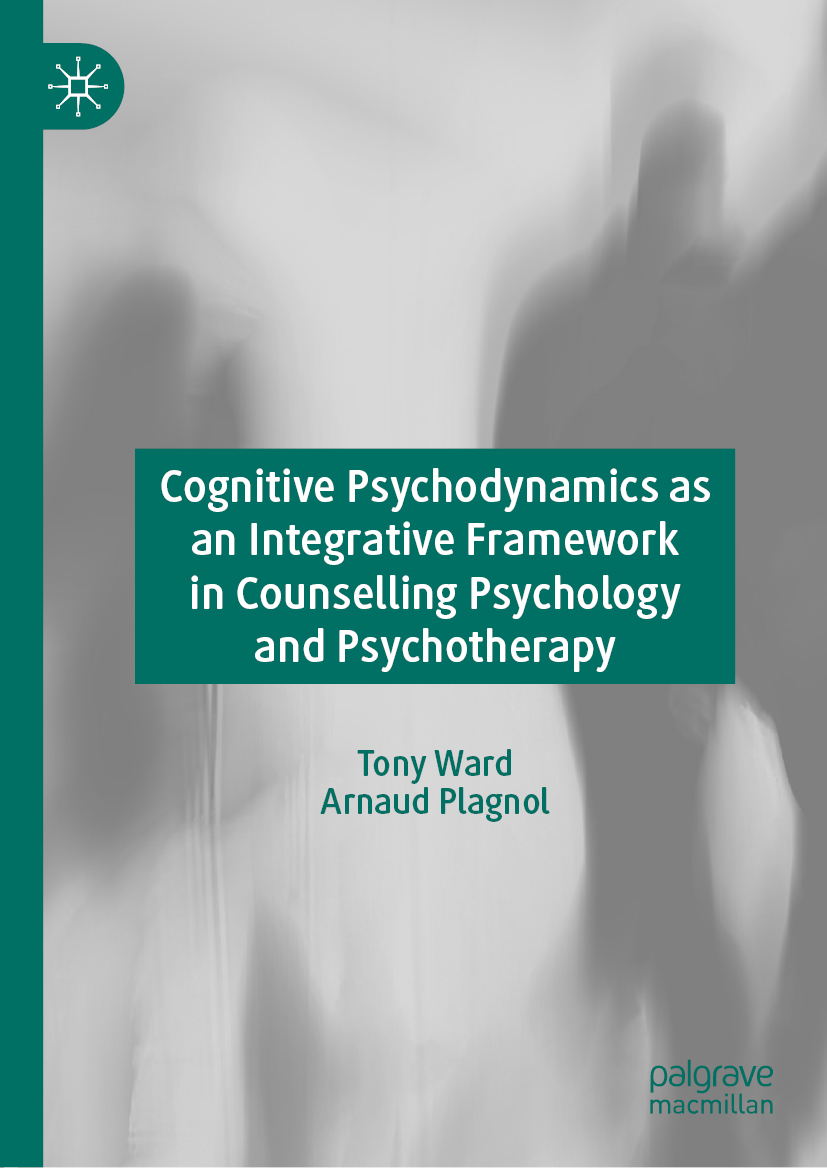Tony Ward and Arnaud Plagnol
Cognitive Psychodynamics as an Integrative Framework in Counselling Psychology and Psychotherapy
Tony Ward
Department of Health and Social Sciences, University of the West of England, Bristol, UK
Arnaud Plagnol
Paris 8 University, St. Denis, France
ISBN 978-3-030-25822-1 e-ISBN 978-3-030-25823-8
https://doi.org/10.1007/978-3-030-25823-8
The Editor(s) (if applicable) and The Author(s) 2019
This work is subject to copyright. All rights are solely and exclusively licensed by the Publisher, whether the whole or part of the material is concerned, specifically the rights of translation, reprinting, reuse of illustrations, recitation, broadcasting, reproduction on microfilms or in any other physical way, and transmission or information storage and retrieval, electronic adaptation, computer software, or by similar or dissimilar methodology now known or hereafter developed.
The use of general descriptive names, registered names, trademarks, service marks, etc. in this publication does not imply, even in the absence of a specific statement, that such names are exempt from the relevant protective laws and regulations and therefore free for general use.
The publisher, the authors and the editors are safe to assume that the advice and information in this book are believed to be true and accurate at the date of publication. Neither the publisher nor the authors or the editors give a warranty, expressed or implied, with respect to the material contained herein or for any errors or omissions that may have been made. The publisher remains neutral with regard to jurisdictional claims in published maps and institutional affiliations.
This Palgrave Macmillan imprint is published by the registered company Springer Nature Switzerland AG
The registered company address is: Gewerbestrasse 11, 6330 Cham, Switzerland
To Adele, Anna, Amy, Marceline and Calista
Preface
Hundreds, if not thousands, of psychotherapy methods have been described. If you have a very liberal mind, you can rejoice in such an offer: A chacun son bonheur! (as they say in the bazars of France). Indeed, such a profusion, undoubtedly a reflection of the complexity and creativity of the human mind, could be welcomed if we had tools to guide clients in choosing a therapy. However, to our knowledge, there is no unified framework where the different types of therapy can be described, their specificities mapped and their indications outlined.
In fact, each school of therapy is rather accustomed to developing on its own account, each claiming to be well founded in clinical experience. The universe of psychotherapies seems to the naive psychology student somewhat compartmentalized between the worlds of these different schools. In particular, a deep canyon seems to separate the bases of cognitive-behavioural therapies from those of psychodynamic or existential therapies. Some build on experimental psychology, others on intuitions about subjective life and the experience of the relationship. The person-centred approach may offer a bridge across this canyon, being concerned both with rooting in science and relying on subjective experience. The fundamental attitudes put forward by Rogersempathy for the subjects inner world, fundamental trust in his/her resources, congruence within the therapists worldwhilst they have inspired all schools of therapy, have so far been unlikely to achieve precise scientific operationalization.
However, advances in cognitive science today make it possible to rely on precise and rigorous tools, supported experimentally, whilst at the same time drawing on the most fertile insights from psychodynamic or existential approaches. For example, it has become possible to propose much more precise constructions of the notion of the inner world , as we will show in this book. It is no longer a utopia to envisage a unified framework where the models proposed by the various psychotherapy schools can be integrated, or even develop tailor-made therapeutic methods targeted according to the clients inner worlds. New fields may even have to be explored in psychopathology and psychotherapy, since contemporary cognitive science makes it possible to explore new dimensions of mental life that have hitherto largely escaped scientific knowledge, such as love, imagination, art or scientific creativity itself.
The aim of this book is to propose the first steps towards a cognitive-psychodynamic approach. After recalling the current context of psychotherapy in Chapter , we will summarize our key ideas and suggest directions for future developments in inner travel and therapy.
Tony Ward
Arnaud Plagnol
Bristol, UK Paris, France
May 2019
Acknowledgements
We would like to thank our respective universities, the University of the West of England, Bristol, and Universit Paris 8, St. Denis, France, for their support over many years. We would also like to thank our colleagues in psychology and the many students we have worked with, who have helped us to reflect on and refine our ideas. At Paris 8, we would especially like to thank the successive directors of the Laboratoire de Psychopathologie et Neuropsychologie, Michle Montreuil and Marie-Carmen Castillo, for their support of innovative research over many years. Finally, we would like to thank all the clients we have worked with in many different settings, who have helped us to develop our clinical ideas and theories. We have felt privileged to be able to meet the inner worlds of our clients and in turn to have our own inner worlds changed by the encounter. We are also grateful to the review Annales Mdico-Psychologiques , Dr. Mirabel-Sarron and Dr. Nicolas Delrue for allowing us to take up in Chapters some of the cases already mentioned in this journal (note that in the text, previously published case material is identified where relevantall other case vignettes are an anonymized amalgamation of issues adapted from a number of clients).
Contents
List of Figures
Chapter 2
Fig. 1 The human cognitive architecture
Fig. 2 Cross section of the human brain
Fig. 3 The limbic system
Fig. 4 Information flow to the amygdala
Chapter 3
Fig. 1 The consistency theoretical model of mental functioning (After Grawe, 2007)
Chapter 4
Fig. 1 The autobiographical memory system (After Conway & Pleydell-Pearce, 2000)
Fig. 2 The hierarchical associative conceptual system
Chapter 5
Fig. 1 The complex interplay of cognitive psychodynamic forces
Chapter 6
Fig. 1 Cognitive psychodynamic forcesthe case of Peter
Chapter 9
Fig. 1 Making a mental journey across London
Fig. 2 The global workspace processes involved in making a mental journey across London
Fig. 3 Representation of fictional narratives by non-clinical subjects (From Plagnol, 1993, p. 107bis. The worlds nodes are the nodes Story A, Story A' The thicker a link is, the more powerful it is. See the six compartments on the figure [each is controlled by a story node]. The six stories were also paired by thematic topics that correspond to other contextual nodes [ACCIDENT, MEETING, CONFLICT]. The node EXPER represents the experimental context)

